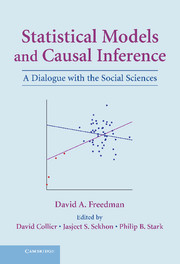Book contents
- Frontmatter
- Contents
- Preface
- Editors' Introduction: Inference and Shoe Leather
- Part I Statistical Modeling: Foundations and Limitations
- Part II Studies in Political Science, Public Policy, and Epidemiology
- 4 Methods for Census 2000 and Statistical Adjustments
- 5 On “Solutions” to the Ecological Inference Problem
- 6 Rejoinder to King
- 7 Black Ravens, White Shoes, and Case Selection: Inference with Categorical Variables
- 8 What is the Chance of an Earthquake?
- 9 Salt and Blood Pressure: Conventional Wisdom Reconsidered
- 10 The Swine Flu Vaccine and Guillain-Barré Syndrome: A Case Study in Relative Risk and Specific Causation
- 11 Survival Analysis: An Epidemiological Hazard?
- Part III New Developments: Progress or Regress?
- Part IV Shoe Leather Revisited
- References and Further Reading
- Index
5 - On “Solutions” to the Ecological Inference Problem
Published online by Cambridge University Press: 05 June 2012
- Frontmatter
- Contents
- Preface
- Editors' Introduction: Inference and Shoe Leather
- Part I Statistical Modeling: Foundations and Limitations
- Part II Studies in Political Science, Public Policy, and Epidemiology
- 4 Methods for Census 2000 and Statistical Adjustments
- 5 On “Solutions” to the Ecological Inference Problem
- 6 Rejoinder to King
- 7 Black Ravens, White Shoes, and Case Selection: Inference with Categorical Variables
- 8 What is the Chance of an Earthquake?
- 9 Salt and Blood Pressure: Conventional Wisdom Reconsidered
- 10 The Swine Flu Vaccine and Guillain-Barré Syndrome: A Case Study in Relative Risk and Specific Causation
- 11 Survival Analysis: An Epidemiological Hazard?
- Part III New Developments: Progress or Regress?
- Part IV Shoe Leather Revisited
- References and Further Reading
- Index
Summary
Abstract. In his 1997 book, King announced “A Solution to the Ecological Inference Problem.” King's method may be tested with data where truth is known. In the test data, his method produces results that are far from truth, and diagnostics are unreliable. Ecological regression makes estimates that are similar to King's, while the neighborhood model is more accurate. His announcement is premature.
Introduction
Before discussing King (1997), we explain the problem of “ecological inference.” Suppose, for instance, that in a certain precinct there are 500 registered voters of whom 100 are Hispanic and 400 are non-Hispanic. Suppose too that a Hispanic candidate gets ninety votes in this precinct. (Such data would be available from public records.) We would like to know how many of the votes for the Hispanic candidate came from the Hispanics. That is a typical ecological-inference problem. The secrecy of the ballot box prevents a direct solution, so indirect methods are used.
This review will compare three methods for making ecological inferences. First and easiest is the “neighborhood model.” This model makes its estimates by assuming that, within a precinct, ethnicity has no influence on voting behavior: In the example, of the ninety votes for the Hispanic candidate, 90 × 100/(100 + 400) = 18 are estimated to come from the Hispanic voters. The second method to consider is “ecological regression,” which requires data on many precincts (indexed by i).
Information
- Type
- Chapter
- Information
- Statistical Models and Causal InferenceA Dialogue with the Social Sciences, pp. 83 - 96Publisher: Cambridge University PressPrint publication year: 2009
